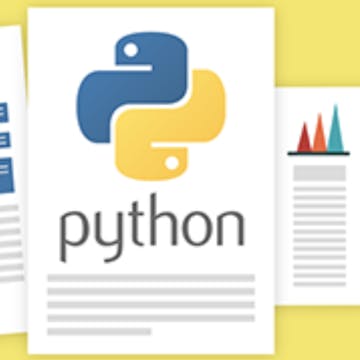
Aprenda a analizar datos con Python. Este curso lo llevará desde los conceptos básicos de Python hasta la exploración de muchos tipos diferentes de datos. Aprenderá a preparar datos para el análisis, realizar análisis estadísticos simples, crear visualizaciones de datos significativas, predecir tendencias futuras a partir de datos, ¡y más!
Tópicos cubiertos:
1) Importación de conjuntos de datos
2) Limpiar los datos
3) manipulación del marco de datos
4) Resumen de los datos
5) Creación de modelos de regresión de aprendizaje automático
6) Construcción de canalizaciones de datos
El análisis de datos con Python se entregará a...
Read more
Good to know
Save this course
Reviews summary
Python data analysis basics
Activities
Review Python syntax
Show steps
Review the basics of Python syntax to ensure a solid foundation for the course.
Browse courses on
Python
Show steps
-
Review variables, data types, and operators
-
Practice writing simple Python scripts
Read 'Data Analysis with Python and Pandas'
Show steps
Enhance theoretical understanding of data analysis concepts and Python implementation.
View
Python for Data Analysis: Data Wrangling with...
on Amazon
Show steps
-
Read selected chapters to supplement course materials
-
Apply concepts from the book to practical exercises
Participate in a Python study group
Show steps
Engage in collaborative learning, share knowledge, and clarify concepts with peers.
Browse courses on
Python
Show steps
-
Join or create a study group with other course participants
-
Discuss course topics, solve problems, and provide support
Four other activities
Expand to see all activities and additional details
Show all seven activities
Solve Python coding problems
Show steps
Enhance problem-solving skills and apply Python knowledge through practice.
Browse courses on
Python
Show steps
-
Identify and understand the problem statement
-
Design and implement a Python solution
-
Test and debug the solution
Explore Pandas tutorials
Show steps
Gain familiarity with Pandas library and its functionalities for data manipulation.
Browse courses on
Pandas
Show steps
-
Follow step-by-step tutorials to learn Pandas basics
-
Apply Pandas functions to manipulate and analyze sample datasets
Build a data visualization dashboard
Show steps
Develop practical data visualization skills and demonstrate insights from data analysis.
Browse courses on
Data Visualization
Show steps
-
Gather and prepare data for visualization
-
Select appropriate visualization techniques
-
Use a data visualization tool to create an interactive dashboard
Contribute to a Python open-source project
Show steps
Gain hands-on experience in open-source development and contribute to the Python community.
Browse courses on
Open Source
Show steps
-
Identify a Python open-source project to contribute to
-
Read the project documentation and codebase
-
Submit a pull request with your contribution
Review Python syntax
Show steps
Review the basics of Python syntax to ensure a solid foundation for the course.
Browse courses on
Python
Show steps
- Review variables, data types, and operators
- Practice writing simple Python scripts
Read 'Data Analysis with Python and Pandas'
Show steps
Enhance theoretical understanding of data analysis concepts and Python implementation.
View
Python for Data Analysis: Data Wrangling with...
on Amazon
Show steps
- Read selected chapters to supplement course materials
- Apply concepts from the book to practical exercises
Participate in a Python study group
Show steps
Engage in collaborative learning, share knowledge, and clarify concepts with peers.
Browse courses on
Python
Show steps
- Join or create a study group with other course participants
- Discuss course topics, solve problems, and provide support
Solve Python coding problems
Show steps
Enhance problem-solving skills and apply Python knowledge through practice.
Browse courses on
Python
Show steps
- Identify and understand the problem statement
- Design and implement a Python solution
- Test and debug the solution
Explore Pandas tutorials
Show steps
Gain familiarity with Pandas library and its functionalities for data manipulation.
Browse courses on
Pandas
Show steps
- Follow step-by-step tutorials to learn Pandas basics
- Apply Pandas functions to manipulate and analyze sample datasets
Build a data visualization dashboard
Show steps
Develop practical data visualization skills and demonstrate insights from data analysis.
Browse courses on
Data Visualization
Show steps
- Gather and prepare data for visualization
- Select appropriate visualization techniques
- Use a data visualization tool to create an interactive dashboard
Contribute to a Python open-source project
Show steps
Gain hands-on experience in open-source development and contribute to the Python community.
Browse courses on
Open Source
Show steps
- Identify a Python open-source project to contribute to
- Read the project documentation and codebase
- Submit a pull request with your contribution
Career center
Data Scientist
Machine Learning Engineer
Business Analyst
Operations Research Analyst
Statistician
Data Analyst
Financial Analyst
Data Engineer
Market Research Analyst
Actuary
Epidemiologist
Data Governance Analyst
Data Architect
Software Engineer
Risk Analyst
Reading list
Share
Similar courses
OpenCourser helps millions of learners each year. People visit us to learn workspace skills, ace their exams, and nurture their curiosity.
Our extensive catalog contains over 50,000 courses and twice as many books. Browse by search, by topic, or even by career interests. We'll match you to the right resources quickly.
Find this site helpful? Tell a friend about us.
We're supported by our community of learners. When you purchase or subscribe to courses and programs or purchase books, we may earn a commission from our partners.
Your purchases help us maintain our catalog and keep our servers humming without ads.
Thank you for supporting OpenCourser.



